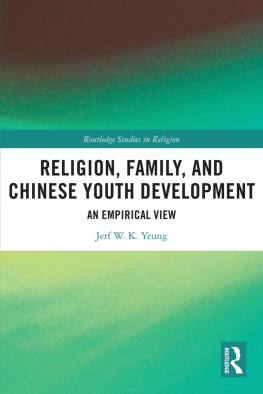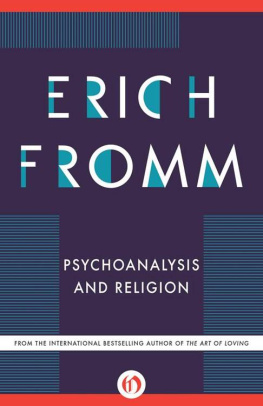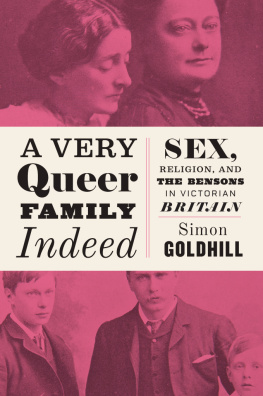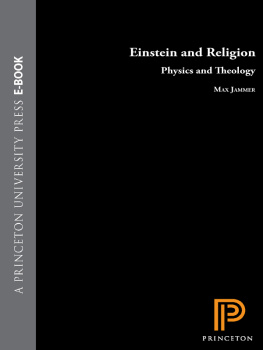ROUTLEDGE LIBRARY EDITIONS: SOCIOLOGY OF RELIGION
Volume 11
RELIGION AND THE FAMILY
RELIGION AND THE FAMILY
Youth and the Gang Instinct
GEOFFREY HOYLAND
First published in 1945 by George Allen & Unwin Ltd
This edition first published in 2019
by Routledge
2 Park Square, Milton Park, Abingdon, Oxon OX14 4RN
and by Routledge
52 Vanderbilt Avenue, New York, NY 10017
Routledge is an imprint of the Taylor & Francis Group, an informa business
1945 George Allen & Unwin Ltd
All rights reserved. No part of this book may be reprinted or reproduced or utilised in any form or by any electronic, mechanical, or other means, now known or hereafter invented, including photocopying and recording, or in any information storage or retrieval system, without permission in writing from the publishers.
Trademark notice: Product or corporate names may be trademarks or registered trademarks, and are used only for identification and explanation without intent to infringe.
British Library Cataloguing in Publication Data
A catalogue record for this book is available from the British Library
ISBN: 978-0-367-02386-7 (Set)
ISBN: 978-0-429-02545-7 (Set) (ebk)
ISBN: 978-0-367-08653-4 (Volume 11) (hbk)
ISBN: 978-0-367-08656-5 (Volume 11) (pbk)
ISBN: 978-0-429-02356-9 (Volume 11) (ebk)
Publishers Note
The publisher has gone to great lengths to ensure the quality of this reprint but points out that some imperfections in the original copies may be apparent.
Disclaimer
The publisher has made every effort to trace copyright holders and would welcome correspondence from those they have been unable to trace.
Religion and the Family
YOUTH AND THE GANG INSTINCT
GEOFFREY HOYLAND
First Published in 1945
All rights reserved
To a true family gang:
A.W.
L.W.
I. W.
M.W.
THIS little book embodies the substance of two series of broadcast talks given in the Home Service programme of the B.B.C. during the autumn of 1944, the first under the title The Family Gang and the second dealing with Home, Children, and Religion. Since both dealt with aspects of the same subject, though they were sponsored by different departments of the B.B.C, it has seemed desirable to combine them in one book. The first series is embodied in , though both have been so rewritten, amplified and modified that the B.B.C. must certainly be absolved from any shade of responsibility for what appears in these pages.
G.H.
CONTENTS
CHAPTER
We have heard much talk in recent years about the break-up of family life and the weakening of parental control. There are many reasons for this change, which amounts to little short of a revolution in the social life of the nation compared with the conditions of half a century ago. The enormous increase in the facilities for quick and easy transport, together with the equally great extension of public amusements, such as skating-rinks, dance-halls and cinemas, has been one powerful factor in the change. Moreover the whole attitude of the State towards the children has altered profoundly during the past century; a hundred years ago children were regarded as the property of their parents who were free to do almost anything they liked to their offspringshort of actually murdering them. Now the State has assumed a general guardianship over the young and the parents are relegated to being little more than their temporary trustees. Compulsory legislation has invaded the nursery, insisting on vaccination in infancy and education from the age of five. Milk and the mid-day meal are to be provided by the State at school, relieving the parents from yet another responsibility. Nursery schools, voluntary to-day, may possibly be compulsory tomorrow; few would be bold enough to maintain that the grandmotherlyor rather foster-motherlyactivities of the State in regard to the children have yet reached their limit and that still more searching encroachments on parental responsibility may not be in store for us.
It is no part of my desire or purpose to decryor even to criticisethese activities on the part of the State. All of them are admirable in intention, and many, so far as they have been realised in practice, have proved of great benefit to the children. But they cast, none the less, a somewhat lurid light upon the civilisation of our time and they form an ironical commentary on the paradox of democracy, for this mass of legislation has been devised by Parliament, and Parliament isat any rate in theoryelected by the people, and the people are, to a considerable extent, the parents! The parents of England are passing votes of no-confidence in themselves; they are abdicating individually in favour of themselves corporately. Alternatively we may regard these reforms as being examples of class-legislation, the careful and able class legislating for the careless or unable. Whichever view we take we cannot but be aware of the irony of the situation.
Along with this change in public policy there has gone, of course, an equally significant change in the attitude of the children themselves towards their elders in the family circle. Emancipation on all fronts is in the air, and the children have reacted, quite unconsciously, to its influence. They no longer regard their parents with the unquestioning awe and deference of the Victorian epoch, they are apt to question their wisdom and rebel against their authority at an earlier age, and they are much more aware of the claims and attractions of the outside world. The parents have contributed to this by a change in their own attitude; they are not so inclined as they were to mount the high horse and lay down the law, there is more real comradeship, give-and-take, and freedom of expression. The parental pedestal, where it has not disappeared altogether, is many feet lower than it used to be. We may sum it all up by saying that the influence of the family upon the children has decreased markedly both in duration and strength; the children escape from it at an earlier age and even while they are subject to it its influence is weaker and more diluted.
If we are satisfied of the general truth of this statement we have next to ask ourselves whether the change is a good oneis it, as the Quakers say, in right ordering? A considerable body of opinion, associated in the main with left-wing political theory, answers unhesitatingly yes. These people trace very many of the ills of bourgeois society to the over-dependence of children upon their parents, emotionally and economically. In Soviet Russia the family has been far more thoroughly liquidated as a social unit than it has in England; the State assumes direct responsibility for the children soon after they are born, and the system under which married women are encouraged and expected to pursue independent wage-earning careers inevitably limits home-life, as we in the West understand the phrase. Those of our own countrymen who hold this opinion are fond of exposing the iniquities of the old Victorian home-domination, with its tyranny and resulting repression; the famousor infamousMr. Barrett of Wimpole Street is their patron devil. On the other hand there are those of a more conservative cast of mind who view the modern tendency with much misgiving. They deplore the loosening of the family bond and are quick to trace the evils of juvenile delinquency to the general weakening of parental control. The great mass of the parents of our countrythose who are neither left-wing liquidators nor the disciples of Mr. Barrettwaver uneasily between the two opinions. They are uncomfortably conscious that modern psychology has produced some hard knocks for unwise parents and they are haunted by the ghosts of such words as repressions, complexes, frustrations, and fixations. They are aware that advanced opinion is against the family, and they feel that there must be something in it. On the other hand many of them look back to their own childhood family experiences with gratitude and affection, realising more and more as the years go by how much they owe to the matrix in which they were moulded. They halt, therefore, perpetually between two opinions, and this uncertainty makes for feebleness and vacillation. They dont quite know what to do about it, so they end up at the ultimate solution of all English folk, that of muddling through.










